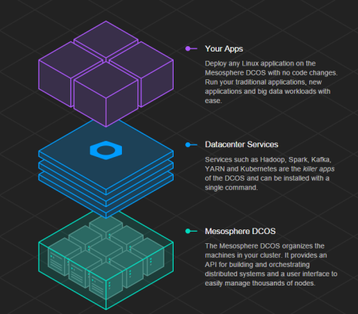Since December, Mesosphere has been promoting a “data center operating system” (DCOS) which makes it easy to handle data center resources such as processors and storage as a single pool. Now it has launched a developer program and software development kit (SDK) intended to ease the learning curve for users.
DCOS is based on the Apache Mesos kernel, which abstracts all computing resources. The SDK enables development for DCOS, using the Java, Scala, Python, Go and C++ languages.
Keep it simple
”The developer program and SDK provide tools — documentation, reference libraries and support — that will make it simple to develop all types of distributed services or applications on top of the DCOS,” says the Mesosphere blog. ”The operative words here are simple and distributed.”
Twitter, Yelp, Groupon and Apple’s Siri are already using DCOS or Mesis. Nearly 4000 users tried DCOS Enterprise Edition as a beta, and it went to a full release in June.
DCOS Enterprise Edition is available for private clouds, public clouds and of course hybrid clouds. It is supported on “all modern versions of Linux” - by which Mesosphere means CentOS, CoreOS, Red Hat and Ubuntu - and on every major cloud provider. It can run on bare metal or virtualized servers, and also supports Docker containers to deploy applications.
With the SDK, Mesosphere hopes that developers inside companies will get stuck into creating vertical software for specific company needs
”We already have large customers in the financial services, media and telecommunications industries, among others, but users of our free cloud-based Community Edition will also have ideas about how they could improve their operations with new distributed services,” says the blog.
Recent software releases running on the DCOS include the Apache Spark data-processing framework and the MemSQL real-time database, along with the less well-known ArangoDB and Crate.
Just to prove it works, Mesosphere put two summer interns to work using the SDK and in a few days, one of them built a Bitcoin miner that absorbs as much resource as possible from a Mesos cluster (let’s hope that one stays where it is) and a “divide-and-conquer algorithm” which calculates the closest distance between 2-dimensional points in a dataset.
Mesosphere also has a “VIP partner program” but hasn’t shared a lot about it.

